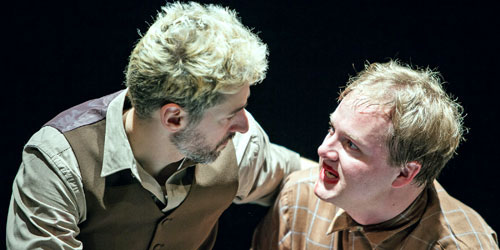By John Quinn

Michael Brian Ogden and Matthew Gwynn in Jeff Daniels' "The Meaning of Almost Everything" at The Purple Rose Theatre. Photo: Sean Carter
But where does one start to describe "The Meaning of Almost Everything?" Shall we begin with the basics? It's a new comedy by actor and playwright Jeff Daniels, his 15th work for the stage. Its world premiere is in production at The Purple Rose Theatre in Chelsea.
This isn't an adequate start; I'll try again.
On a bare, thrust stage two men seek answers to the really Big Questions. They occupy a timeless, undefined, but familiar "inside;" yet an "outside" exists – maybe. "A" is comfortable and complaisant inside; "B" is willing – maybe – to dare the outside.
No, that's a plot summary rather than a start. They say that "the third time's the charm."
Jean-Paul Sartre writes in his work "Existentialism is a Humanism," "… man first of all exists, encounters himself, surges up in the world – and defines himself afterwards." Ah, that may be the place to start describing one of the most perplexing, yet fulfilling experiences to grace the stage in recent memory.
As philosophies go, existentialism is something of a hash, a potpourri of contrasting and contradictory flavors. But there is a pervading taste – the belief that "being" begins with actions and feelings. One isn't real until one is willing to experience. "Lose yourself in the moment," writes Daniels. But action implies change, and "A," played by Matthew Gwynn, is perfectly happy in inaction. The tension between "A" and the more daring "B" – Michael Brian Ogden – is the crux of "The Meaning of Almost Everything."
But finding "meaning" in the text is a poor start in describing why the play is so appealing. Like existentialism, it's an olio of borrowed bits and pieces, a little vaudeville, a little farce; a little fear, pain and suffering. The term for telling actors where to go – on stage, that is – is "blocking." It's a crude process compared to Guy Sanville's work. He didn't block, he choreographed. Every step, every gesture in this energetic romp contributes to the whole; there's nothing extra. In Gwynn and Ogden we enjoy the art of two actors totally in control both physically and vocally.
The designers of "The Meaning of Almost Everything" offer paradoxes totally in keeping with the spirit of the play. Their work is so subtle, so integral, that it doesn't draw attention. It starts with Gary Ciarkowski's blank slate of a set, black floor boards backed by deep purple curtains. It continues with a soft medley of browns in costumes by Christianne Myers. Noele Stollmack's wondrously flexible lighting is almost like a third character in the show – albeit a silent, unobtrusive one.
But the technical achievement that sticks in the memory is yet another brilliant sound design by Quintessa Gallinat; it's omnipresent, but only draws attention at the proper moments. Its highlight is a gentle laughter turned maniacal, until it can't be distinguished from hysterical sobbing. As a metaphor for the human condition, it sends chills down the spine.
I've come to the end, but I haven't started to adequately describe the experience of "The Meaning of Almost Everything." If Sartre is right, and humanity begins with experience, then take action and experience the play yourself. It's the human thing to do.
REVIEW:
'The Meaning of Almost Everything'
The Purple Rose Theatre Company, 137 Park St., Chelsea. Wednesday-Sunday through March 9. 70 minutes; no intermission. $18.50 – $42. 734-433-7673. http://www.purplerosetheatre.org










